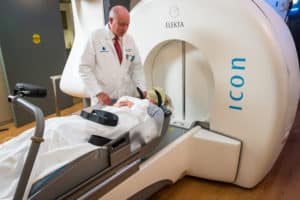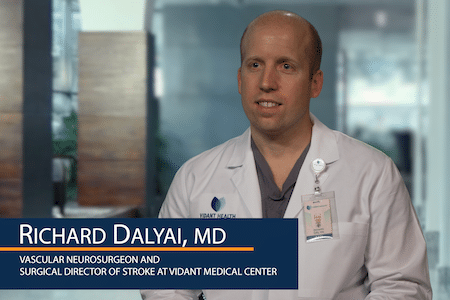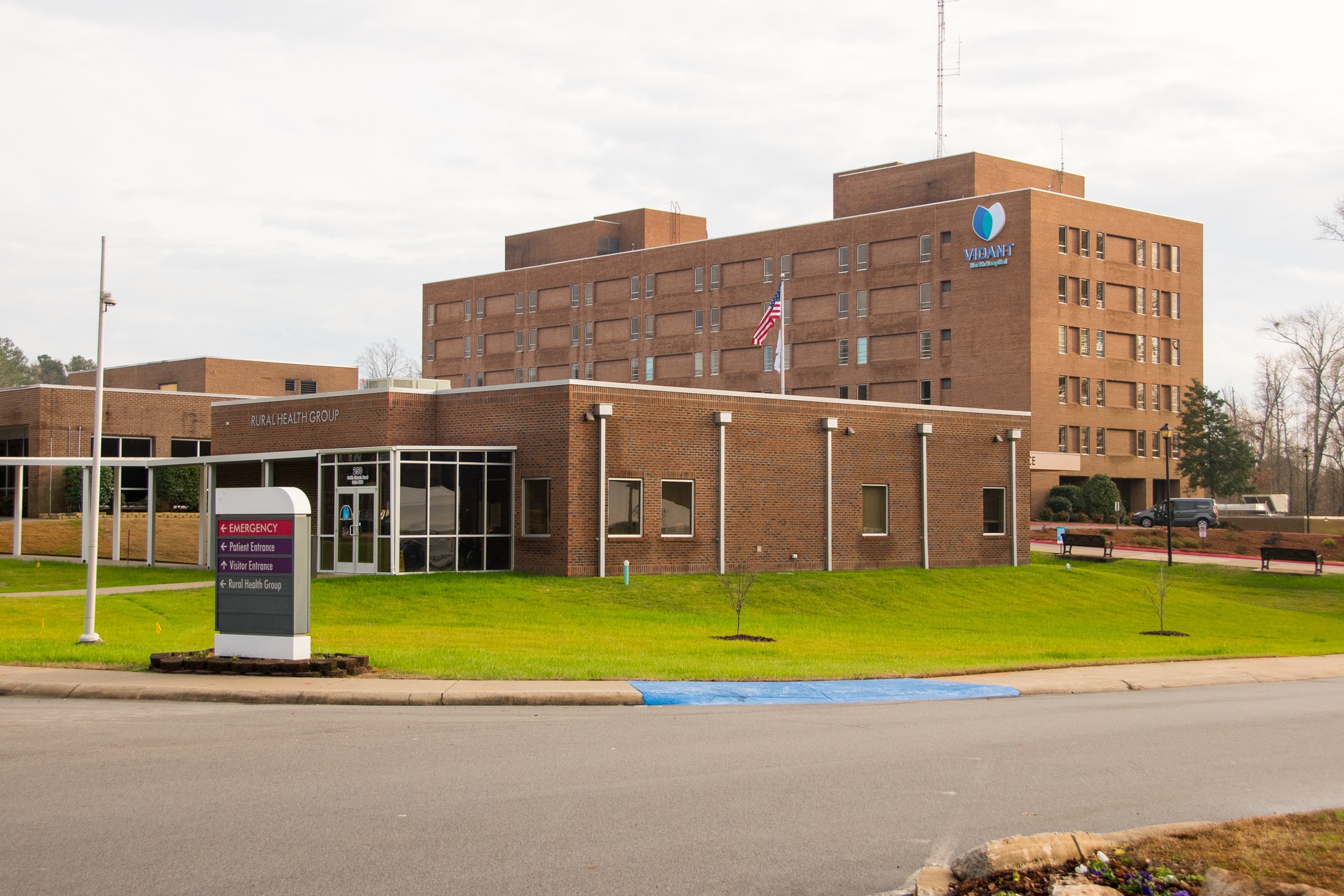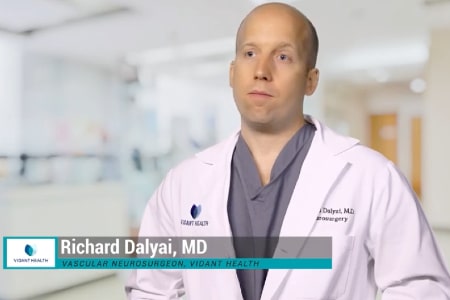Dr. Dalyai joined WITN during Stroke Awareness Month in May to discuss stroke issues in the area.
“People here in North Carolina are so much more likely to have a stroke and to die from a stroke than elsewhere in the country,” Dr. Dalyai said, “and even more so in eastern North Carolina than other parts of North Carolina.”
There are many different factors that can lead to stroke, including hypertension, or high blood pressure, smoking and diets that are high in fat. There is also a genetic component and there is a racial disparity in that strokes are more common in African Americans.
To spot the signs of a stroke, it is important to remember the acronym B-E F-A-S-T.
B – Balance, watch for a loss of balance
E – Eyes, vision changes
F – Face drooping
A – Arm weakness
S – Speech difficulty
T – Time to call 911
Dr. Dalyai said there are a number of ways to prevent stroke, depending on your risk factors. He said talk with your primary care provider to determine your risk and what you can do to stay healthy.
“The biggest thing that we tell patients is that they really should work with their primary care provider to focus on their specific needs,” Dr. Dalyai said. “Whether it’s medications or diet, physical activity, all these things that are specific to you that you can do to reduce your risk of having a stroke.”
ECU Health Medical Center passes 2,000 Gamma Knife treatments

ECU Health Medical Center (VMC) was proud to recognize its 2,000th Gamma Knife treatment in April.
“I am incredibly proud of this important milestone in Vidant’s collective work to realize a life without cancer,” said Dr. Stuart Lee, chief, division of neurosurgery, Vidant Health and medical director of The Gamma Knife Center, VMC. “Our teams work passionately to support those battling cancer. Those across our region can access advanced technology close to home, which reduces the need to travel elsewhere to receive treatment. By performing 2,000 Gamma Knife® procedures, we are delivering on our mission to improve the health and well-being of eastern North Carolina.”
The Gamma Knife® at VMC is one of only two in North Carolina and the newest version, the Gamma Knife®ICON, was installed in 2018. The Gamma Knife® works by destroying cancer cells, which shrinks the size of brain tumors over time. This technology offers quick recovery time and can be done in an outpatient setting, preventing the need for hospitalization. Gamma Knife® also provides convenience by requiring minimal follow-up procedures, reducing barriers related to travel for the patient.
“On behalf of ECU Health Cancer Care, I want to express my sincere gratitude to Dr. Lee and his team,” said Chris Wood, senior administrator, ECU Health Cancer Care. “Nearly all of us are impacted in some way by cancer, whether it’s through our own personal experiences, or the experiences of a loved one. Dr. Lee and his team are an important part of how ECU Health Cancer Care provides for those we love and serve who are battling cancer.”
To learn more about the full spectrum of Neurological Care, including neurology and neurosurgery, visit VidantHealth.com.
 Roanoke Rapids, N.C. – July 15, 2021 – Vidant North Hospital is proud to announce it has been designated as a primary stroke center by The Joint Commission and the American Heart/Stroke Association, recognizing the hospital’s preparedness and expertise to care for stroke patients. Stroke is one of the leading causes of death in the state, resulting in more serious long-term disabilities than any other disease.
Roanoke Rapids, N.C. – July 15, 2021 – Vidant North Hospital is proud to announce it has been designated as a primary stroke center by The Joint Commission and the American Heart/Stroke Association, recognizing the hospital’s preparedness and expertise to care for stroke patients. Stroke is one of the leading causes of death in the state, resulting in more serious long-term disabilities than any other disease.
According to the North Carolina State Center for Health Statistics, both Halifax and Northampton counties show increase incidences of stroke disease and mortality compared to the North Carolina average. “Here in eastern North Carolina we are at the center of a lot of strokes. North Carolina is about 8 percent worse for stroke mortality than the rest of the nation and in eastern North Carolina it is even a bigger risk,” said Dr. Richard Dalyai, neurosurgeon and surgical director of stroke services at Vidant Health. “Providing high-quality stroke care close to home is central to our mission of improving the health and well-being of eastern North Carolina.”
As a primary stroke center, Vidant North can treat and stabilize patients experiencing an acute stroke and care for more complex patients. Because time is one of the most important factors in treating stroke, it is vitally important to provide stroke care close to home. Vidant North’s stroke certification increases proximity to quality care in the Roanoke Rapids area, which reduces the risk of mortality, permanent brain damage and other side effects including memory loss, difficulty speaking and potential paralysis.
During the certification process, Vidant North was evaluated on performance measures in stroke care, including education for patients and families on stroke risk factors and recognizing symptoms of stroke. Other performance measures included staff education on stroke protocols and the appropriate prescription of medications to address stroke risk factors such as elevated cholesterol.
“Stroke certification from The Joint Commission represents Vidant North Hospital’s commitment to provide high-quality stroke care to not only patients experiencing stroke symptoms, but to all of our patients,” said Jason Harrell, president of Vidant North. “We are proud of being designated a primary stroke center and the commitment and diligent work of our team members across all levels and services to make this a reality.”
“We’ve seen patients delay care because they want to see if things will potentially get better on their own, or they don’t want to interact with the hospital or they are concerned about getting COVID-19,” said Dr. Richard Dalyai, a vascular neurosurgeon with Vidant Health.
While Dr. Richard Dalyai understands those concerns, he’s also worried about what it may mean for the stroke patients he serves.
“Patients in eastern North Carolina are about four times more likely to die of a stroke than North Carolina itself,” said Dr. Dalyai. “We know that the treatments that we do are highly effective, but they are most effective within a four, six or eight-hour window.”
Time is of the essence for many of the conditions Vidant treats.
“Eastern North Carolina has a population with a lot of comorbid conditions and chronic conditions, like heart disease and cancer, diabetes, strokes,” said Brian Floyd, chief operating officer for Vidant Health. “We’ve built a health system here to manage that and help people deal with those chronic conditions.”
Vidant is ready and safe.
“Vidant has been working very hard for months now to make sure this is a safe place,” said Floyd.
“Our standards remain the same, of excellent care,” Dr. Dalyai said. “During the pandemic, for patients with COVID-19, as well as for patients without COVID-19.”
Those standards apply to providing sound medical advice as well.
“It’s a confusing time, sorting through medical information that’s available on social media and through the internet,” said Dr. Dalyai. “To get the proper and best information is going to be from your health care provider.”
Vidant has a Community Resource Line available 12 hours a day. That number is 252-847-8000 and answered from 8 a.m. to 8 p.m. seven days a week.


